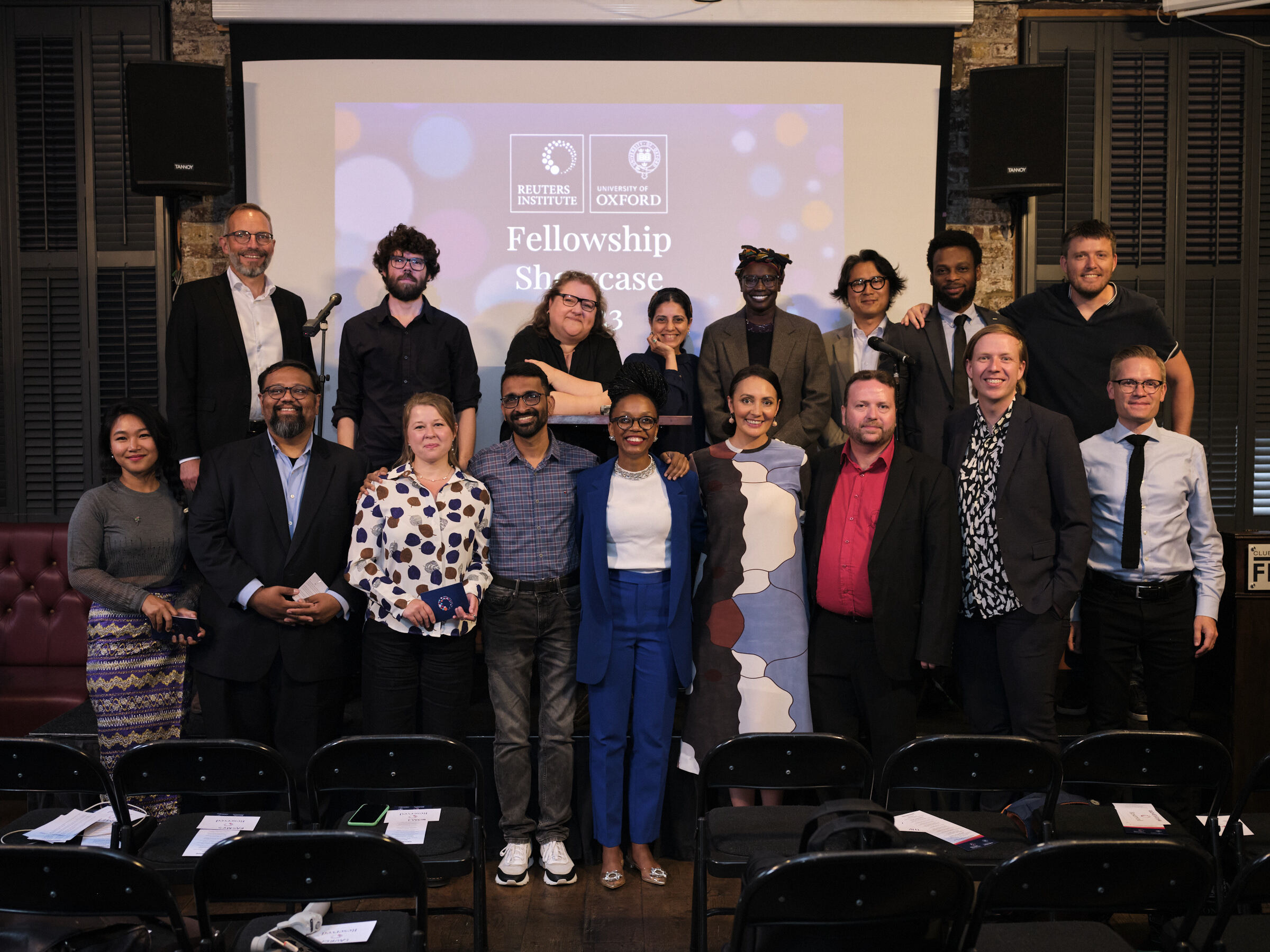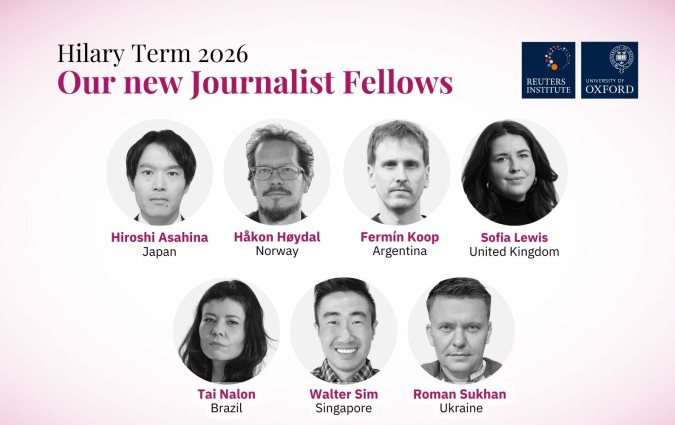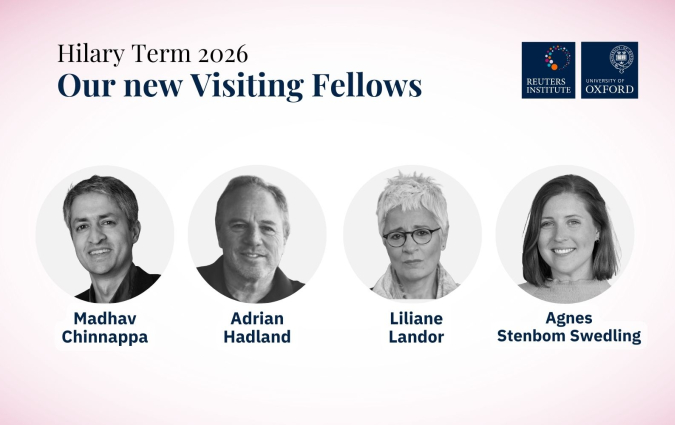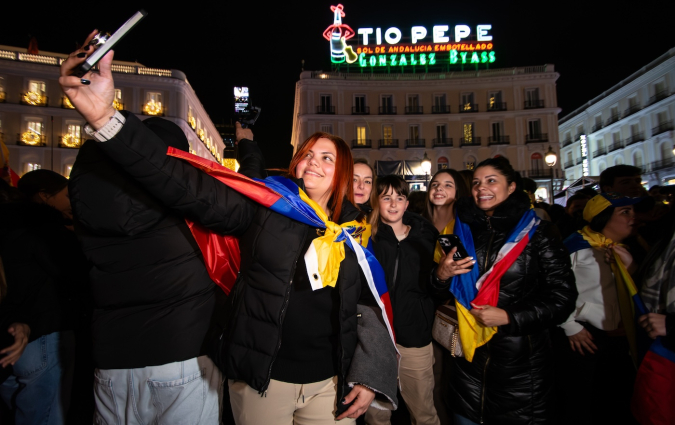How to fix journalism? Our Journalist Fellows discuss potential solutions at our annual event

Credit: Andrew Bailey
On Monday, June 26, our Journalist Fellows marked the end of their time at the Reuters Institute by presenting their projects at the Frontline Club in London. Each member of this cohort of experienced mid-career journalists from around the world has spent much of their fellowship exploring in-depth a critical aspect of journalism and working on a project detailing their conclusions. They discussed topics as varied as applying a climate lens to Islamic finance reporting and retaining young talent in newsrooms. However, what united their talks was a focus on tackling the current challenges facing the journalism industry head-on, and a curiosity in exploring the possible solutions.
Thu Thu Aung, our fellow from Myanmar, and Ayen Bior from the US and South Sudan focused on citizen journalism and journalistic safety in their joint presentation. They began by illustrating how the use of what are simple, everyday journalistic tools in the West can present dangers to reporters in some countries.
“In some countries, a device can be a serious threat. This mic that I am speaking through is probably not intimidating to you. But one journalist in South Sudan told me, in his country, the presence of a microphone is more alarming than that of a gun,” Ayen said. Similarly, Thu Thu shared that even just taking a photograph can be a criminal offence in Myanmar. She shared the story of Eh Muu, a young citizen journalist who was forced to flee his home after authorities declared him a criminal.
“Eh Muu shows how much danger and personal sacrifice citizen journalists have to undertake. There is an urgent need to provide emergency budgets to exiled media outlets, and capacity training to citizen journalists,” Thu Thu said.
Next to speak was Radheshyam Jadhav, our fellow from India, whose project focuses on building a new model for empowerment journalism. “Only three per cent of stories about agriculture, land rights, and rural economy, and two per cent of the stories on development issues and sustainability, feature women as a central focus. Only one per cent of stories on sustainable development goals and zero per cent of stories on climate change address gender issues,” he said. This is not representative of the reality on the ground, where many of the world’s agricultural and livestock workers are women, who also face gendered discrimination and oppression. “Empowerment is a process of a constructive struggle against oppression and empowerment journalism is reporting this process,” Radheshyam explained.
Jussi Latvala, our fellow from Finland, and Tarjei Leer-Selvesen from Norway focused on the themes of transparency and collaboration. “Cross-border journalism has exposed how oligarchs and banks jump jurisdictions to pay as little tax as possible. I keep wondering: besides exposing the rich, isn’t there also something we can learn from them? While the rich jump between legislations to pay as little tax as possible, we could also learn to cross borders to obtain as much information as possible,” Tarjei said.
Jussi’s project looked at the impact of transparency in journalism and taking audiences behind the scenes of how they carry out their reporting. “Does [journalistic] transparency increase audience trust? There has been lots of research on this, and the results are kind of disappointing: journalistic transparency tends to have… zero or modest effect on evaluations of trust,” Jussi said.
Bridget Brennan’s presentation explored lessons in Indigenous coverage. “As First Nations journalists covering our own communities, we've had to fight for every story to get told. In largely white newsrooms, not only do we suffer vicarious trauma from the personal nature of our work, but often we're arguing with editors to simply believe in our investigations,” she shared. “We can’t do this alone. We need non-Indigenous editors, managers, and colleagues to shoulder some of this burden. We need newsroom leaders to have the tools to empathise with the unique and often demoralising experience of being an Indigenous reporter,” Bridget said.
Jacob Fuglsang, our fellow from Denmark, and Philippe Watanabe from Brazil explored new perspectives in journalism. Based on conversations with Danish editors, Jacob concluded that the journalistic expression ‘if it bleeds, it leads’ is no longer accurate. “If the focus doesn’t reflect humans’ hope and struggle to make things better, media will be avoided and seen as irrelevant,” Jacob said.
Philippe discussed the idea of Shifting Baseline Syndrome, the phenomenon that people’s accepted norms gradually change over time, and spoke of the impact it can have on important journalistic output like climate coverage. “I believe that journalism can play a part. The only way for people to be aware of change is by showing them. That is our job,” Philippe said.
'Fisayo Soyombo from Nigeria focused on the targeted discrediting of journalists. He told the story of two reporters who faced this issue, Nigerian journalist Peter Nkanga and Mexican journalist Daniel Sanchez, both of whom were targeted because of their reporting. “Could something have been done to avert the discrediting of these journalists?” 'Fisayo asked, adding, “Sanchez believes not much can be done about it in the third world. ‘We require the support of international civil organisations,’ he says.”
Our fellow from Bangladesh Asif Islam’s presentation looked at framing Islamic finance in the context of the climate crisis. “A huge paradigm shift is unfolding around the world, and it impacts every newsroom. I call it the Climate Nexus: it’s a series of emergencies forcing journalists to ask of every story: How does this help address the crisis?” Asif explained, adding that it is time for this framework to be applied when reporting about Islamic finance.
Mpho Raborife, our fellow from South Africa, explored new approaches to address the modern problem of newsroom retention, after noticing that many talented young journalists are leaving the profession. “To retain journalists, we need more opportunity for development, a more nurturing environment, flatter leadership structures, and collaboration. More diversity, more internships…” she said.
Hideki Mushiake, our fellow from Japan, is looking into lessons from Finnish public broadcaster YLE. Hideki examined the successes of digital transformation at YLE. He said: “We need more innovation and a more audience-centric approach.”
Our fellow from Russia is working on understanding the role of the Russian Orthodox church in advancing Putin’s war narrative. They prefer not to be named at this time.




